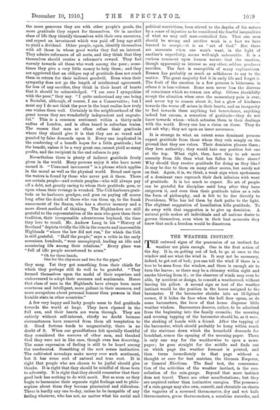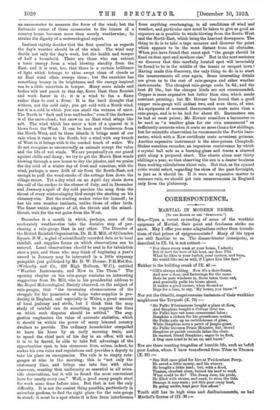THE WEATHER INSTINCT.
THE outward signs of the possession of an instinct for weather are plain enough. One is the first action of the day. It is, on getting out of bed, to go at once to the window and see what the wind is. It may not be necessary, indeed, to get out of bed; you can tell the wind if there is a tree to be seen from the window, and there is enough air to turn the leaves ; or there may be a chimney within sight and smoke blowing from it ; or the observer of winds may even be able, by accident or design, to consult a weathercock without leaving his pillow. A second sign or test of the weather instinct would be the position in the house assigned to the barometer. If the barometer shrinks into an ill-lighted corner, if it hides its face when the hall door opens, as do some barometers, the fares of that house dispense little weather wisdom. Barometers deserve, rather, to be admitted from the beginning into the family councils ; the morning and evening tapping of the barometer should be, as it were, the shaking of hands with a friend. After the tapping of the barometer, which should probably be hung within reach of the staircase down which the household descends for breakfast, comes the opening of the morning paper. There is only one way for the weatherwise to open a news- paper ; he goes straight for the middle and finds out on which page the weather forecast is printed, and then turns immediately to that page without a thought or care for test matches, the German Emperor, or General ;Elections. The final test, the consumma- tion of the activities of the weather instinct, is the con- sultation of the rain-gauge. Beyond that mere instinct does not travel. There are other manifestations ; but they are acquired rather than instinctive energies. The possessor of a rain-gauge may also own, consult, and chronicle on charts the vagaries of a screened thermometer, dry and wet bulb thermometers, grass thermometers, a sunshine recorder, and
an anemometer to measure the force of the wind; but the fortunate owner of these accessories to the leisure of a country house becomes more than merely weatherwise ; he attains the dignity of a meteorological expert.
Instinct rightly decides that the first question as regards the day's weather should be of the wind. The wind may decide not only the day's work, but the health and temper of half a household. There are those who can extract a tonic energy from a wind blowing steadily from the East, and it is true, too, that there is a certain brilliance of light which belongs to skies swept clean of clouds as an East wind often sweeps them ; but the sunshine has something brassy in its brightness, and the energy inspired can be a little uncertain in temper. Many more minds and bodies wilt and parch in that day, fierce blast than flourish and work faster in it; it is a wind to fan a flame rather than to cool a fever. It is the hard drought that withers, not the cold only; you get cold with a North wind, but it is a cold in which you can smell the wetness of snow. The North is " dark and true and tender," even if the darkness is of the snow-cloud ; but snow on an East wind stings like salt. The wind which has never a hint of a quarrel in it blows from the West. It can be keen and blusterous from the North-West, and in these islands it brings most of our rain when it veers to the South, but a wind with any breath of West in it brings with it the needed touch of water. We do not recognise as unreservedly as animals accept the value and the life of wet winds. We are perpetually on our guard against chills and damp; we try to get the March East winds blowing through a new house to dry the plaster, and we praise the dry cold of a winter day of frost and sunshine, with the wind, perhaps, a mere drift of air from the South-East, not enough to puff the wood-smoke of the cottage fires down the village street. Yet a dry wind on an April day shuts down the call of the cuckoo to the silence of Jnly, and in December and January a spell of dry cold parches the song from the throat of every winter-singing bird except the starling on his chimney-rim. But the starling makes rules for himself ; he has his own weather instincts, unlike those of other birds. The finest winter singers of all, the thrush and the missel- thrush, wait for the wet gales from the West.
December is a month in which, perhaps, more of the moderately weather-wise take the decisive step of pur- chasing a rain-gauge than in any other. The Director of the British Rainfall Organisation, Dr. H. R. Mill, of 62 Camden Square, N.W., is glad of scientifically recorded data as to local rainfall, and supplies forms on which observations can be entered. Local observations should be sent in for tabulation once a year, and those who may think of beginning a year's record in January may be interested in a little sixpenny painphlet just published by Mr. D. W. Horner, F.R.Met.Soc. (Witherby and Co., 326 High Holborn, W.C.), entitled " Weather Instruments, and How to Use Them." The opening chapter on the rain-gauge contains an interesting suggestion from Dr. Mill, who in his presidential address to the Royal Meteorological Society observed, on the subject of rain-gauges, that " the increasing strenuousness of the etruggle for the possession of large water-supplies is pro- ducing in England, and especially in Wales, a great amount of local jealousy and strife, but I think that the map study of rainfall can do something to suggest the lines on which such disputes should be settled." The sug- gestion emphasises the value of accurate statistics, which it should be within the power of many leisured country dwellers to provide. The ordinary householder compelled to leave his home by an early morning train, and to spend the chief part of his day in an office, will not, it is to be feared, be able to take full advantage of the opportunities open to less strenuous lives, unless, indeed, he makes his own rules and regulations and provides a deputy to take his place on emergencies. The rule is to empty rain- gauges at nine in the morning ; this is "not only the customary time, and brings one into line with other observers, creating that uniformity so essential in all scien- tific observations, but it will be found the most convenient hour for nearly every one." Well, a good many people start for work some time before nine. But that is not the only difficulty. It is not the easiest thing possible, particularly in suburban gardens, to find the right place for the rain-gauge to stand; it must be a spot where it is free from interference from anything overhanging, in all conditions of wind and weather, and particular care must be taken to give as good an exposure as is possible to winds blowing from the South-West and the North-East, which bring the heaviest downpours. The thing to do is to take a tape measure and discover the point which appears to be the most distant from all obstacles. When you have found that exact spot " the gauge should be fixed on that spot and nowhere else." But in the next sentence we discover that this carefully located spot will invariably be found to be in the middle of the tennis or croquet lawn ! Having made this discovery, the only thing to do is to start the measurements all over again. Some interesting details are given as to the cost of rain-gauges and other weather instruments. The cheapest rain-gauge costs 7s. 6d., and the best £2 10s., but the cheaper kinds are not recommended. Copper is more expensive but better than zinc, which needs constant painting ; but Mr. Horner has found that a good copper rain-gauge will outlast two, and even three, of zinc. An equipment of screened thermometers costs more than a rain-gauge, and is to be had for about £5. Barometers can be had at most prices ; Mr. Horner considers a barometer to be used as "a weather glass for our own amusement" as sufficiently accurate when it costs no more than a few shillings, but for scientific observation he recommends the Fortin baro- meter, which with a Kew certificate costs seventeen guineas. Another expensive instrument is the nine-guinea Campbell- Stokes sunshine recorder, an ingenious contrivance by which a crystal ball acts as a burning-glass and traces a charred path along a prepared chart. The charts alone cost thirty shillings a year, so that observing the sun is a dearer business than making calculations about rain. But that, as the cynical critic would retort, regarding the skies of the past fortnight, is just as it should be. If it were an expensive matter to measure rain, we should get rain measurements in England only from the plutocracy.



























































 Previous page
Previous page